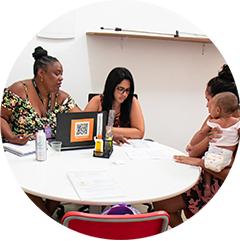AN ENCOUNTER WITH THE STRUGGLE fFOR RIGHTS IN MARÉ
This is the column Who Makes Redes, a compilation of the stories of people who build our organization and who work hard every day to do what we do best: actions and projects for residents of Maré. Learn about these stories, trajectories, experiences and the history of Redes da Maré itself - and how this work and the challenges faced since the pandemic have transformed them.
Andreia Martins (49) arrived in Maré in February 2001, straight from her graduation ceremony at the Federal University of Rio de Janeiro (UFRJ). The education researcher did not know our region and had no experience in civil society institutions. Today, she is part of the board of Redes da Maré and cannot see herself without this proximity with the territory: "I am very grateful to everything and everyone who allowed me to be part of this project of struggle and guarantee of rights for residents of Maré".
Andreia was born and raised in Duque de Caxias and joined the university at 23, after she started working. She came to Maré to teach writing classes in some schools here, and with this opportunity she got to know the territory and realized that her trajectory in academic life was similar to that of many young people from Maré. She got a master's degree from PUC-Rio, studied the quality of teaching, and also got a Ph.D., always based on work related to education issues in Maré. Currently, she follows the Education projects of Redes da Maré, a structuring axis linked to the origin of the organization.
During the campaign 'Maré says NO to Coronavirus', Andreia worked in many fronts: she helped the teams of the database, social interviews and fundraising, in addition to organizing and carrying out deliveries of food baskets and cleaning kits. "Today, Redes da Maré has consolidated itself as a reference in the sector for other institutions working for a fairer world," she says.
More than the recognition, for Andreia, Redes da Maré is an institution legitimized by the residents of Maré. The initiatives developed by the organization follow a methodology that includes social mobilization and production of knowledge, "which leads to greater legitimacy in the dialogue with the government and with partners who are sensitized and express the desire to support our actions," notes the researcher, and concludes: "Redes da Maré is giant like Maré, it brings the power of mobilization and struggle of the residents.”
At this moment, with the increase in the numbers of cases and deaths by Covid-19, for the researcher, it is difficult to think about what to expect in the post-pandemic moment because we will have a long fight ahead. An aggravating factor is an even worse scenario regarding social inequality in the country and in the world. What is expected is that the population of slums and peripheries will suffer even more with the denial of basic rights such as housing, health, education, and public security. "This situation will demand from all those who work for the guarantee of rights, more articulation and networking to collectively mitigate the devastating effects that we will have in the coming years, not only because of the pandemic, but because of a whole national political context.”











